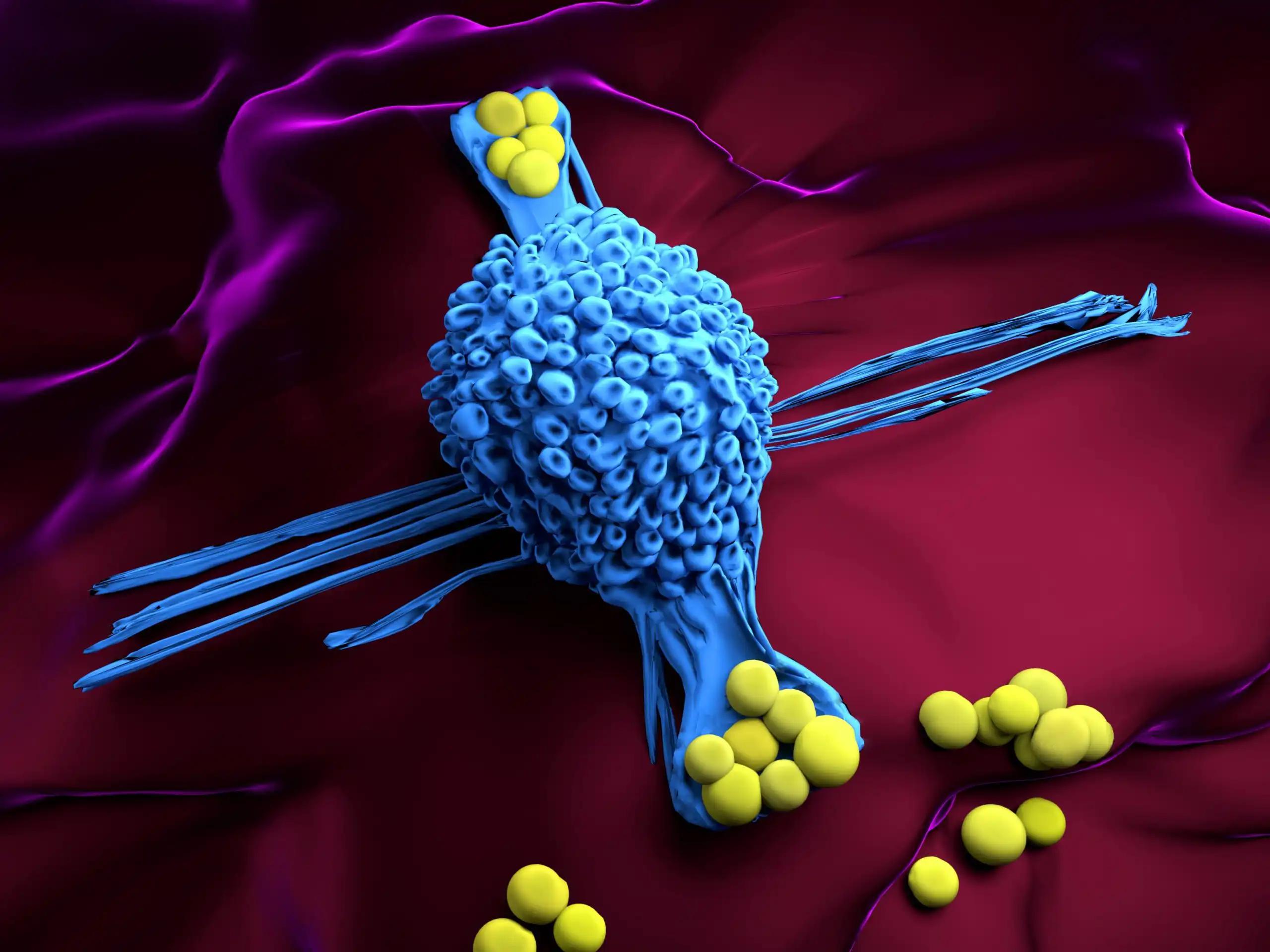KEY TAKEAWAYS
- The study aimed to assess the efficacy and safety of various therapeutic vaccines in advanced NSCLC patients.
- The primary outcomes were OS, PFS and AEs.
- The study found adding a vaccine to standard treatment showed little to no improvement in survival or progression for lung cancer, with some safety concerns for certain vaccines.
Advancements in immunotherapy employing targeted antigens to stimulate anti-tumor immune responses in lung cancer patients offer promising avenues for developing therapeutic vaccines.
Marcela Cortés-Jofré and her team conducted a study that aimed to assess the efficacy and safety of various therapeutic vaccines in individuals diagnosed with advanced non-small cell lung cancer.
The study conducted a search of CENTRAL, MEDLINE, Embase, Wanfang Data, and China Journal Net (CNKI) up to 22 August 2023. Selection criteria included parallel-group, randomized controlled trials assessing a therapeutic cancer vaccine, either alone or combined with other treatments, in adults (> 18 years) with advanced NSCLC, irrespective of the treatment line. Standard methodological procedures expected by Cochrane were employed for data collection and analysis.
The primary outcomes included overall survival (OS), progression-free survival (PFS), and serious adverse events (AEs), while secondary outcomes were 3 and 5-year survival rates and health-related quality of life (QoL).
About 10 studies, involving 2177 participants, were included. Outcome analyses were based on 2045 participants (1401 men and 644 women). The certainty of evidence varied across vaccines and outcomes, ranging from moderate to very low. Primary outcome results were the addition of the vector-based vaccine, TG4010, to chemotherapy in first-line treatment may not significantly impact OS (HR 0.83, 95% CI 0.65 to 1.05; 2 studies, 370 participants; low-certainty evidence).
This may slightly increase PFS (HR 0.74, 95% CI 0.55 to 0.99; 1 study, 222 participants; low-certainty evidence). There may be no substantial difference in the proportion of participants with at least one serious treatment-related adverse event (TRAEs), but evidence remains highly uncertain (RR 0.70, 95% CI 0.23 to 2.19; 2 studies, 362 participants; very low-certainty evidence).
When compared to best supportive care as switch maintenance treatment post first-line chemotherapy, the epidermal growth factor vaccine may not significantly affect OS (HR 0.82, 95% CI 0.66 to 1.02; 1 study, 378 participants; low-certainty evidence) and the proportion of participants experiencing at least 1 serious TRAEs (RR 1.32, 95% CI 0.88 to 1.98; 2 studies, 458 participants; low-certainty evidence).
The hTERT (vx-001) vaccine, when compared to placebo as maintenance treatment following first-line chemotherapy, may not substantially impact OS (HR 0.97, 95% CI 0.70 to 1.34; 1 study, 190 participants).
In comparison to placebo as switch maintenance treatment post-chemotherapy, racotumomab was evaluated in 1 study involving 176 participants. This may enhance OS (HR 0.63, 95% CI 0.46 to 0.87), with minimal to no effect on PFS (HR 0.73, 95% CI 0.53 to 1.00) and the proportion of individuals experiencing at least 1 serious TRAEs (RR 1.03, 95% CI 0.15 to 7.18).
Racotumomab versus docetaxel as switch maintenance therapy post-chemotherapy was evaluated in one study involving 145 participants. Although the study did not report hazard rates for OS or PFS time, the difference in median survival times was minimal, less than 1 month. Racotumomab may not significantly differ from docetaxel in the proportion of individuals experiencing at least 1 serious TRAEs (RR 0.89, 95% CI 0.44 to 1.83).
The addition of a personalized peptide vaccine to docetaxel, compared to docetaxel plus placebo as post-chemotherapy treatment, may not substantially affect OS (HR 0.80, 95% CI 0.42 to 1.52) or PFS (HR 0.78, 95% CI 0.43 to 1.42).
The OSE2101 vaccine, when compared with chemotherapy following chemotherapy or immunotherapy, may not significantly affect OS (HR 0.86, 95% CI 0.62 to 1.19). This may result in a slight difference in the proportion of individuals experiencing at least 1 serious TRAEs (RR 0.95, 95% CI 0.91 to 0.99).
The SRL172 vaccine, comprising killed Mycobacterium vaccae, when added to chemotherapy versus chemotherapy alone, may not substantially impact OS. However, this may increase the proportion of individuals experiencing at least 1 serious TRAEs (RR 2.07, 95% CI 1.76 to 2.43; 351 participants).
The study findings indicated that adding vaccines generally did not significantly impact overall survival, except for racotumomab, which showed marginal improvement over placebo, albeit with a minimal difference in median survival time (1.4 months) and a small sample size (176 participants).
The PFS differences were negligible across treatments, except for TG4010, which may slightly enhance PFS. Notably, serious TRAEs were comparable among treatments, except for SRL172 (killed Mycobacterium vaccae) combined with chemotherapy, associated with increased AEs, and OSE2101, which potentially decreased AEs occurrence.
However, caution is warranted in interpreting these conclusions due to the very low to moderate certainty of evidence, stemming from single-study evaluations with limited participant numbers and events.
No funding related information was available.
Source: https://pubmed.ncbi.nlm.nih.gov/38470132/
Cortés-Jofré M, Rueda-Etxebarria M, Orillard E, et al. (2024) “Therapeutic vaccines for advanced non‐small cell lung cancer.” Cochrane Database of Systematic Reviews 2024, Issue 3. Art. No.: CD013377. DOI: 10.1002/14651858.CD013377.pub2. Accessed 18 March 2024.



